How much does help desk software cost? In general, pricing for help desk software comes in the following types:
In this article, you will find a comprehensive comparison of pricing plans to make browsing easier for you. We will weigh the pros and cons of each payment package as well as provide some examples that may help you determine which one has the most potential for giving you a better ROI.
When companies receive a flurry of messages from customers asking for assistance, it can be challenging to give all of them an equal amount of attention in a timely manner. Hence, help desk software tools were created to help simplify and speed things up. But, how can you possibly choose the best one from among dozens of available options out there? The most straightforward answer: measure its value for money.
Before getting down to the nitty-gritty, we will first discuss a few pointers on what to look for when buying a help desk software. This way, we not only focus on software that offers the lowest price but also help you zero in on programs from which you can get the most use out of.
What to Look for in a Help Desk Software

Source: Global State of Multichannel Customer Service Report
According to the Global State of Multichannel Customer Service Report, 97% of respondents believe that customer service is an important factor when it comes to a consumer’s loyalty to a particular brand or organization. Meaning, providing good customer support is just as important as producing quality products.
However, not all help desk platforms are created equal. There are software solutions that offer basic ticket management systems and multi-channel support for a small price while there are premium options that cost more in exchange for advanced integrations and robust data reporting tools. So, before you start comparing prices, look for these features first:
- Flexible Ticketing Management Tool. Often included in premium plans, customizable ticketing systems can help you adapt based on the current needs of your system. This way, you won’t have to implement a new platform every time your requirements change.
- Email Compatibility. In the chart provided, a majority of consumers’ most commonly used customer service channel is email. Make sure your clients can reach you more conveniently by finding a help desk platform that is compatible with your emailing system. Luckily, most programs provide this, be it in their free or paid plans.
- Live Chat. In a study by Forrester Research titled “Making Proactive Chat Work,” 44% of online consumers say that live chat is one of the most important features a website can offer. This allows you to engage customers as they check out your products, increasing the chances of conversion.
- Knowledge Base Repository. Products or services have their respective sets of guidelines the same way all appliances come with manuals. When looking for a help desk program, be sure to choose one that has a knowledge base. This way, your support staff can get access to all the information about your brand and your products with ease.
- Data Security. Your help desk system handles a lot of confidential data. Safeguard the names, addresses, and other sensitive information of your customers by making sure your help desk platform has security tools. These are often included in basic subscription plans and premium software packages.
- Seamless System Integrations. The needs of every company can evolve as time passes, making it imperative that you implement a flexible help desk platform. To do this, you must choose a program that not only provides regular updates but can also support multiple integrations.
Types of Help Desk Software Pricing Packages

So, how much do help desk software cost? Prices vary, but they often depend largely on your company’s size and requirements. To help you get a better grasp of this, we have compiled some of the most common types of help desk platform pricing packages.
Free Application
Free applications may be categorized in three different ways. The first one is pretty self-explanatory–it lets you enjoy the services an application has to offer, free of charge. The second one, which is referred to as freemiums, is a pared-down version of paid plans that require you to pay for advanced tools, integrations, and other capabilities that you might need as your business grows. Lastly, there is an open API option, which we will be discussing later.
These options are great for startup companies and small businesses that do not have the financial resources to invest in expensive software solutions. However, not all free applications are scalable, so if you cannot upgrade it to suit the needs of your growing company, you may have to find a different tool.
Examples of Help Desk Platforms With Free Plans:
Freshdesk

Freshdesk is an award-winning help desk platform built to cater to the customer support needs of small to large businesses. Built with features for help desk ticketing as well as a knowledge base and community platform, this software can also provide insights, time tracking solutions, and email management options. It can run satisfaction surveys, support multiple languages and brands, as well as integrate with live chat, phone support, and game mechanic applications. This product is also a boon for entrepreneurs who want to view their customer support efforts and their CRM status in one convenient platform. For all these merits, our expert review team recognizes it as one of the top apps in the category. You can try its features at no cost when you sign up for a Freshdesk free trial here.
While Freshdesk offers monthly and annual subscriptions, it also has a free plan called Sprout that can support unlimited agents. It is inclusive of an email channel, a standard phone channel, a basic social channel, and a knowledge base. This package also lets you access their app gallery.
Zoho Desk
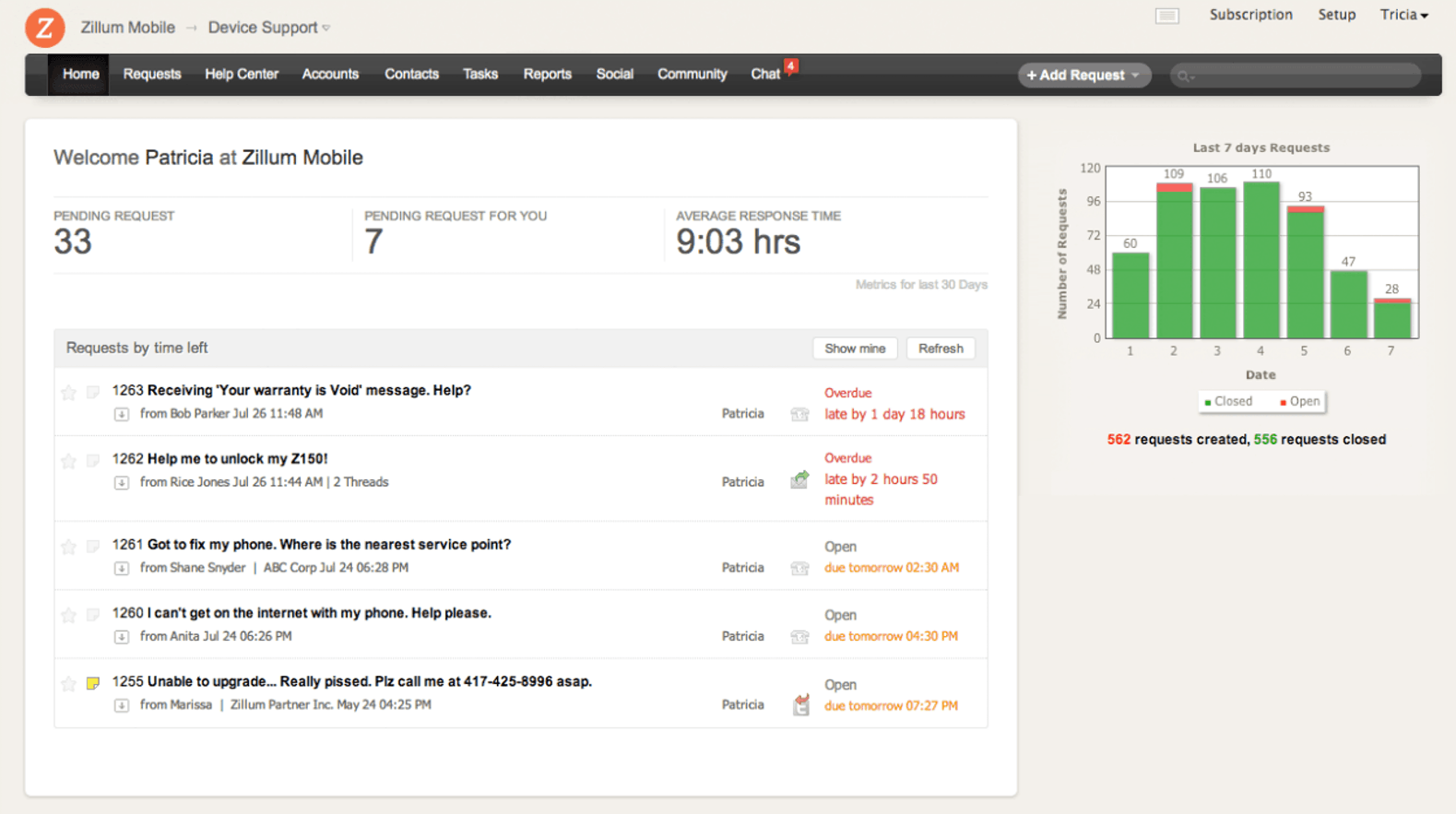
The industry’s first context-aware support desk system, Zoho Desk offers comprehensive tools to help you deliver better customer service effortlessly. It is equipped with a ticketing system, a call center application, a social support tool, company-wide collaboration capabilities, and other help desk essentials. Offering SMB and enterprise payment packages, Zoho Desk also offers a free plan that can support up to 10 users and provide help desk essentials such as email and ticket management, knowledge base function, basic reporting, and domain mapping. You can check out its features without worrying about paying an upfront fee when you sign up for a Zoho Desk free trial here.
Open API
Open API, as mentioned earlier, can be classified as a type of free application. This subscription plan includes the basic program as well as access to certain internal functions of its system. More often than not, these kinds of software solutions can be republished as you desire, without being restricted by copyrights or patents. This is great for businesses with in-house IT professionals or web developers who can create systems tailored to the company’s needs.
Example of a Help Desk Program With Open API:
osTicket
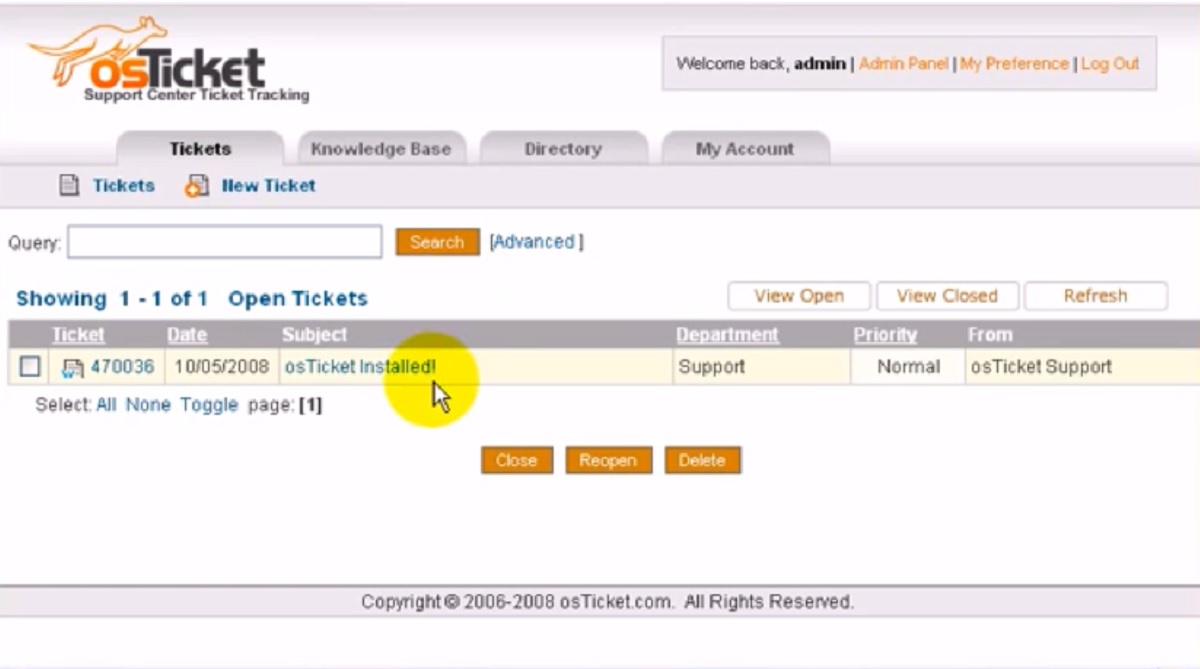
osTicket is an open-source customer support software specializing in ticket management. It has a complete suite of features that enable you to collect incoming inquiries across different channels, manage and delegate tickets, as well as store help desk data in a customer portal. It is completely configurable, making it easy to implement. Offering monthly subscriptions for those who want advanced features, osTicket also has a free self-hosted plan that can support unlimited tickets and users as well as configurable attachments.
Monthly Subscription
Are you looking to subscribe to a platform but do not want to commit to it for a long period of time? Then monthly subscriptions may be the option for you. This pricing scheme will allow you to use all the features and capabilities of a particular software while paying small amounts for the service monthly. Ideal for businesses that can’t afford to allocate a large amount of money for software, monthly subscriptions are also great for growing companies that are still in the process of determining the kinds of software that they need.
Example of a Help Desk Platform With Monthly Pricing Plans:
Zendesk
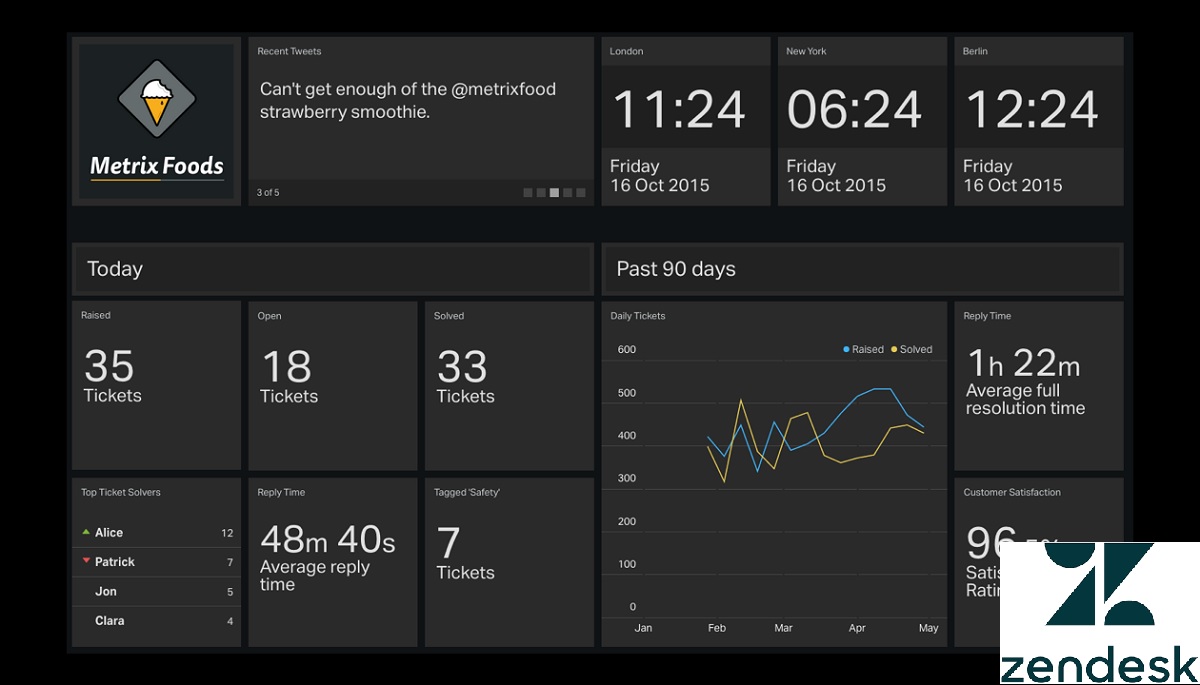
Zendesk is a cloud-hosted suite of customer support applications. Offering ticket management features, multi-channel support, screencasting tools, and CSS rebranding capabilities, this platform also provides reporting and analytics solutions. On top of that, it has an open API that lets you seamlessly merge the platform with over 100 out-of-the-box integrations and third-party applications. For pricing, Zendesk offers five monthly plans ranging from $5/agent to $199/agent, depending on the types of features you will be using and how advanced the tools are. For more comprehensive help desk functionalities, Zendesk offers its Suite packages starting with $89/agent/month and a build-your-own enterprise plan. There are add-on products available, as well. If you want to check its features you can easily do so when you sign up for Zendesk free trial here.
Per-User Pricing Tier
Per-user pricing schemes or user-based payment plans charge according to the number of people who will be using the software. Often inclusive of complete access to program features, this subscription package is great for businesses who want to forecast revenues and ROI more easily. However, the downside to this is that it can get costly for enterprises with a large workforce and growing businesses who have yet to determine the number of people they will be employing in the future.
Examples of Help Desk Platforms With Per-User Pricing Plans:
LiveAgent
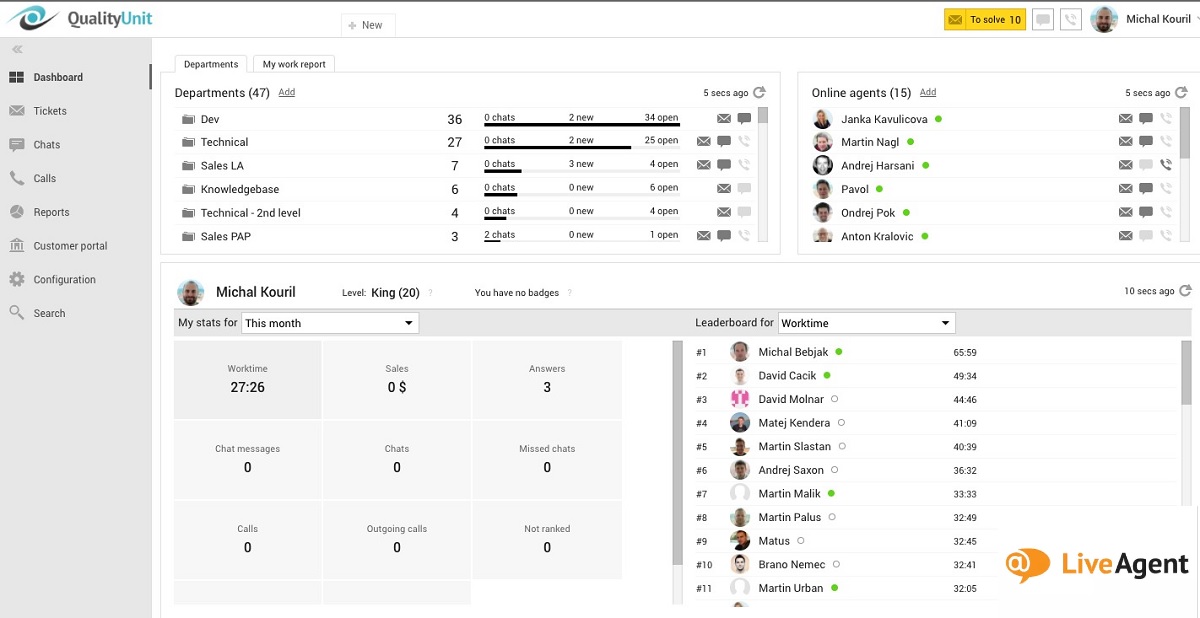
LiveAgent is an award-winning help desk support platform known for its powerful and intuitive features. From live chat and email support to social media integration and ticket management, this software promotes better client engagement for businesses of all sizes. Easy to set up and implement, this application is chock full of robust features that reinforce your customer support efforts and boost customer relations. LiveAgent offers three types of user-based plans: Ticket Plan, Ticket + Chat, and All-Inclusive, which are priced at $12, $29, and $59/agent/month, respectively. You can sign up for a LiveAgent free trial here.
Freshservice

Freshservice is a cloud-based customer support platform created for small startups, mid-sized businesses, and large enterprises alike. It has a comprehensive suite of tools for ticketing, asset discovery, vendor management, incident management, advanced reporting, survey creation, domain mapping, and time tracking. Equipped with a knowledge base, this platform is easy to install and maintain. Freshservice has three user-based monthly plans that are billed annually: Blossom at $29/agent, Garden at $49/agent, and Estate at $79/agent. You may also choose to purchase additional assets for 20 cents/asset/month. You can take a closer look at its features at no cost when you sign up now for Freshservice free trial here.
By-Quote Plan
While quote-based plans can be expensive, this type of pricing scheme is one of the most cost-efficient options available. This kind of payment package allows you to maximize your subscription by optimizing your software according to your company’s needs. More often than not, software providers offering this kind of payment plan will ask you regarding the features you will be needing, the nature of your business, as well as the size of your company. This way, they can make sure that they are charging you only for what you need.
Examples of Help Desk Programs With Quote-Based Pricing:
Samanage

An IT service desk and asset management software, Samanage offers a full suite of tools that can be deployed via the cloud. It is a flexible platform that can streamline your ticketing systems, monitor contracts, detect risks, and provide self-service portals for your customers. Known for its award-winning features, the program also has an intuitive design that provides an in-depth analysis of your performance as well as supports multiple integrations. As for their quotes, the price will often depend on the number of agents and devices your company requires. Should you want to get a better grasp of their platform before requesting an estimate, perhaps, you should sign up for their 14-day free trial first. You can easily sign up for Samanage free trial here before you request a quote.
SysAid

SysAid is a help desk and asset management platform for large enterprises. Offering configurable and scalable modules for ticket management, communication, and inventory handling, the platform allows you to oversee customer support efforts using both desktop and mobile devices. The software is also an all-in-one IT service management solution that can support multiple integrations and third-party applications. For pricing, be sure to get in touch with their representative to get a quote.
One-Time Licensing Fee
Help desk platforms are also sold through one-time licensing fees rather than via subscriptions. Often created for on-premise software solutions, this payment plan is a good option for companies who can pay a large amount of money upfront. Compared to subscriptions, this can be a more cost-efficient alternative as you won’t have to continuously pay for the same product regularly. However, software solutions acquired using this pricing plan often don’t come with regular updates or 24/7 tech support.
Examples of Help Desk Programs With One-Time Licensing Fees:
Vision Helpdesk

An award-winning customer support platform, Vision Helpdesk offers three modules: the multi-channel help desk, the satellite desk, and the service desk. These are built to handle ticket management automation, email parsing, client management, reports and analytics, as well as task management. Capable of integrating with third-party applications, this platform can also support multiple languages. Vision Helpdesk offers three one-time licensing plans costing $150 to $350 per agent.
KronoDesk
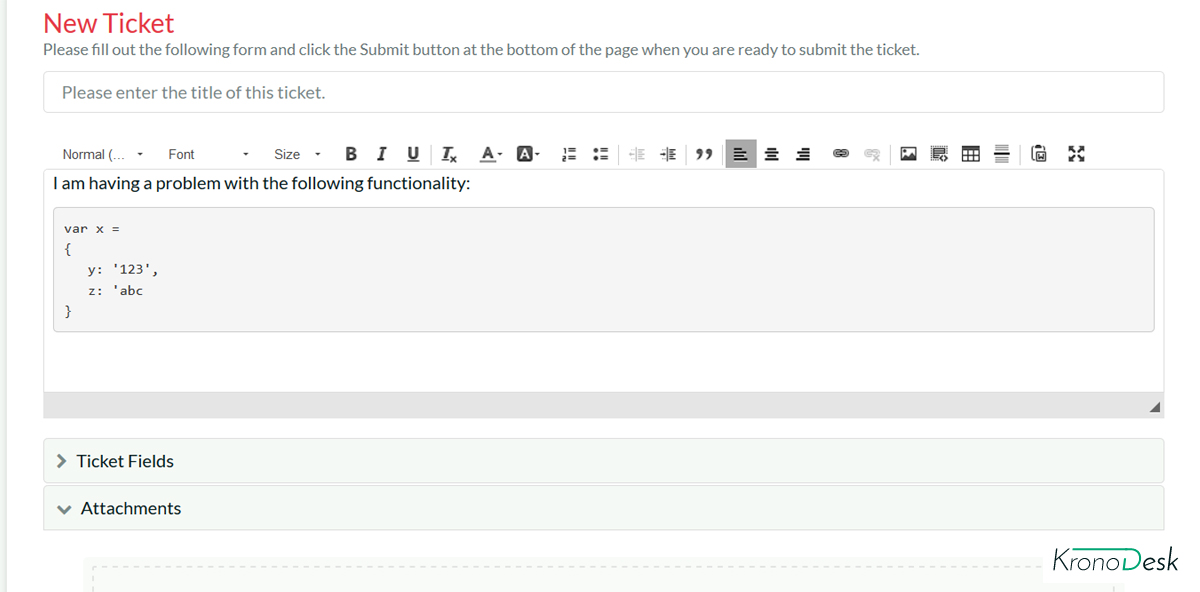
KronoDesk is a streamlined help desk system with knowledge base access and tools for ticketing, customer support, and email automation. Fuss-free, user-friendly, and easily configurable; this web-based platform is built for businesses of all sizes. You may purchase the on-premise version of KronoDesk by paying one-time license fees that are priced depending on the number of users. It ranges from $99.99 for the Starter plan to $15,999.99 for the Enterprise plan.
Software Bundle
If you are looking for a help desk system but do not necessarily want to purchase a tool that solely focuses on customer support, then this is a boon for you. There are many CRM and ERP programs out there that include help desk features or can be integrated with customer support tools. This way, your investment can be used for multiple aspects of your business operations–not just customer support.
Example of a Help Desk Program That Come in Software Bundles:
WorkWise
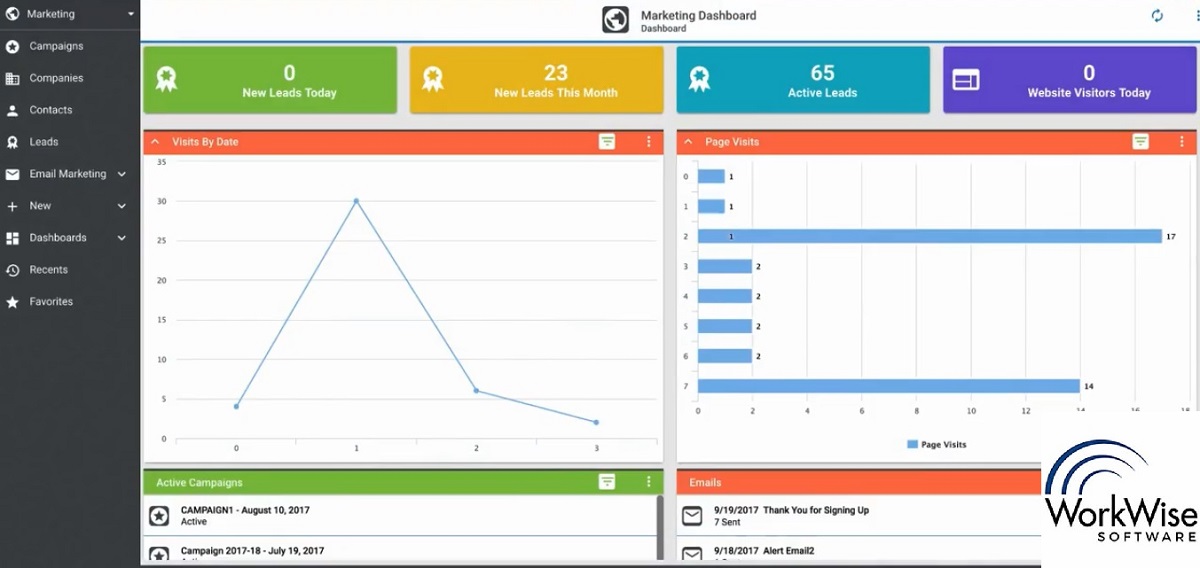
WorkWise is an enterprise resource planning software created for medium-sized manufacturing firms. With over 25 applications built into its system, it has everything you need, from billing and scheduling to inventory management and order processing. On top of that, it also has a robust customer support system for call center operations. WorkWise offers two monthly plans based on software deployment. Their cloud CRM is available at $60/user, while their on-premise CRM costs $995/user with extra charges for annual maintenance.
What factors impact the long-term cost of help desk software?
When investing in help desk software, it’s crucial to consider not only the upfront pricing but also the ongoing and hidden costs that can impact long-term ROI. Understanding these factors helps businesses budget accurately and avoid unexpected expenses down the line.
- Scalability and User Growth: As a business grows, so does the demand for additional user licenses and features. Many help desk software platforms charge per user, which can significantly increase costs over time. Choose software with flexible pricing plans that accommodate scaling without drastically raising expenses.
- Customization and Integration Costs: Integrating help desk software with existing CRM, ERP, or communication tools can enhance efficiency but may involve additional setup fees or require third-party tools. Customization options might also come at an extra cost, so it’s essential to check whether the platform offers native integrations or if these will need to be purchased separately.
- Training and Onboarding: Effective use of help desk software often requires initial training for team members. Vendors may offer training sessions at an additional cost, while complex software might require extensive onboarding, incurring further expenses. Opt for software with comprehensive onboarding and easy-to-use interfaces to reduce training time and costs.
- Maintenance and Support: Ongoing technical support is essential for troubleshooting and optimizing the system. Some vendors provide limited support within basic plans, charging additional fees for premium or 24/7 support. Clarify support terms to ensure adequate assistance without unexpected charges.
- Security and Compliance Upgrades: Businesses handling sensitive customer information may need advanced security features or compliance certifications (such as GDPR compliance). These features are sometimes bundled with premium plans, potentially raising costs for companies needing high data security.
- Software Updates and Upgrades: Regular software updates and new feature rollouts keep the system running smoothly and securely. Some vendors include updates in their subscription plans, while others charge for major upgrades. Choose software that aligns with your budget for both minor updates and substantial version upgrades.
Conclusion
Customers want to receive great service just as companies want to deliver it. So, as they search for businesses that can meet these demands, entrepreneurs should also strive to go above and beyond to satisfy their customers through the use of sound help desk platforms.
Now that we have answered the question “how much does help desk software cost,” you can start browsing for platforms that suit your business. To help you narrow down the list of programs to choose from, be sure to check out our list of top 20 help desk programs available on the market. We also have information on the history of help desk platforms if you want to learn more about its beginnings and how it evolved into one of the most in-demand tools for businesses.
Key Insights
- Diverse Pricing Models: Help desk software pricing varies widely, offering flexibility through free plans, monthly subscriptions, per-user pricing, by-quote plans, and one-time licensing fees. This allows businesses to choose a plan that best suits their size, needs, and budget.
- Importance of Features: Key features to look for in help desk software include flexible ticket management, email compatibility, live chat, knowledge base repository, data security, and seamless system integrations. These features ensure efficient customer support and adaptability to changing business requirements.
- Free Options for Startups: Free help desk software plans are ideal for startups and small businesses with limited budgets. Examples include Freshdesk’s Sprout plan and Zoho Desk’s free plan, which offer basic support functionalities.
- Scalability with Paid Plans: For growing businesses, scalable options like Zendesk’s monthly plans and LiveAgent’s per-user plans provide advanced features and customization, supporting business growth without the need for frequent platform changes.
- Customization with Open API: Open API plans, such as osTicket, offer customization and flexibility, allowing businesses with in-house IT teams to tailor the software to their specific needs.
- Cost-Effective One-Time Fees: One-time licensing fees, available with platforms like Vision Helpdesk and KronoDesk, provide a cost-efficient alternative for businesses willing to make an upfront investment, avoiding ongoing subscription costs.
- Bundled Solutions: For comprehensive business operations, software bundles like WorkWise offer help desk features alongside other ERP or CRM functionalities, maximizing the return on investment by covering multiple business areas.
FAQ
1. What are the different pricing models available for help desk software?
Help desk software pricing models include free plans, monthly subscriptions, per-user pricing tiers, by-quote plans, one-time licensing fees, and software bundles. Each model offers different benefits depending on the business’s size, needs, and budget.
2. What features should I look for in a help desk software?
Key features to look for include flexible ticket management, email compatibility, live chat, knowledge base repository, data security, and seamless system integrations. These features ensure efficient customer support and adaptability to changing business needs.
3. Are there free help desk software options available?
Yes, there are free help desk software options available. Examples include Freshdesk’s Sprout plan and Zoho Desk’s free plan, which offer basic support functionalities suitable for startups and small businesses.
4. What is the advantage of monthly subscription plans for help desk software?
Monthly subscription plans offer flexibility and affordability, allowing businesses to use the software’s features without a long-term commitment. They are ideal for businesses that cannot allocate a large upfront budget and need to adjust their software needs over time.
5. How does per-user pricing work for help desk software?
Per-user pricing schemes charge according to the number of users accessing the software. This model often includes complete access to the program’s features and is suitable for businesses that want to forecast revenues and ROI more easily.
6. What are by-quote plans, and who should consider them?
By-quote plans are customized pricing plans based on a business’s specific needs, such as the number of agents and required features. These plans are ideal for businesses looking to optimize their software investment by paying only for what they need.
7. What is the benefit of one-time licensing fees for help desk software?
One-time licensing fees provide a cost-efficient alternative for businesses willing to make an upfront investment. This model avoids ongoing subscription costs and is suitable for businesses that prefer owning their software outright.
8. Can help desk software be integrated with other business systems?
Yes, many help desk software solutions offer seamless integrations with other business systems, such as CRM, ERP, and communication tools. This integration enhances efficiency by allowing businesses to manage multiple aspects of their operations in one platform.
9. Are there help desk software options included in software bundles?
Yes, some help desk software solutions come as part of software bundles, such as WorkWise, which includes help desk features alongside other ERP or CRM functionalities. This approach maximizes the return on investment by covering multiple business areas.
10. How can I determine the best help desk software for my business?
To determine the best help desk software for your business, consider your budget, the size of your company, the specific features you need, and the scalability of the solution. Reviewing different pricing models and trying out free trials can also help you make an informed decision.






























Leave a comment!